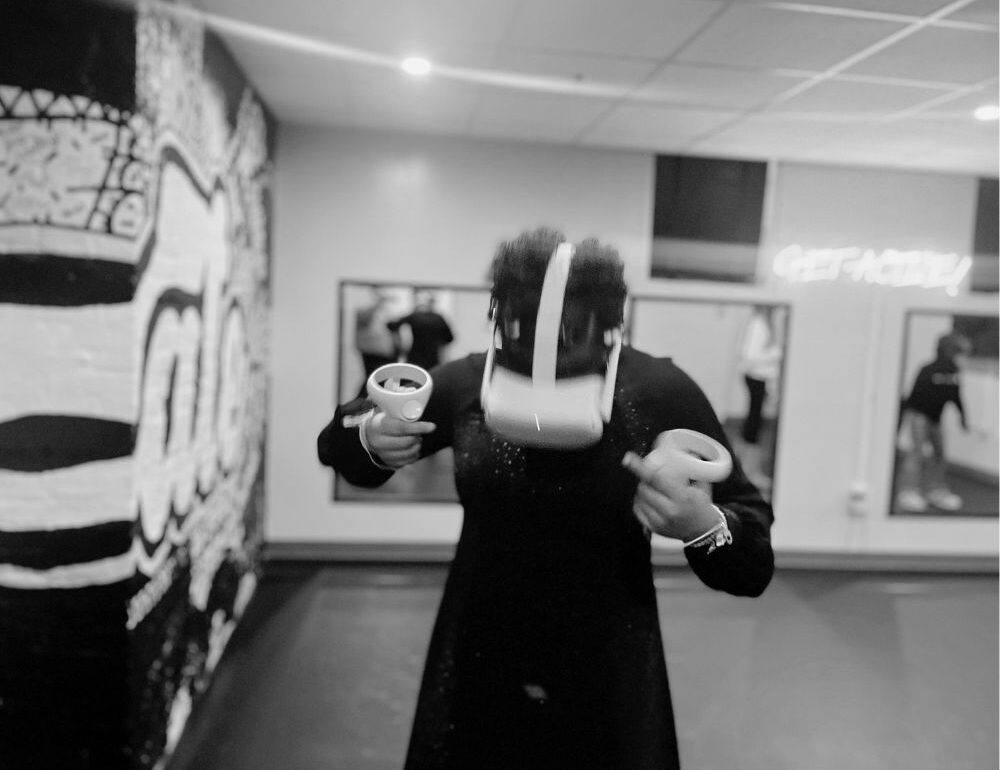A combination of funding sources, program partners, a state initiative and support from a telecommunications and media giant paved the way for the Greenmount West Community Center (GWCC) on Guilford Avenue to get its first digital literacy coordinator.
Before getting this position established, the GWCC was one of the first local sites in Comcast’s Lift Zones initiative, which brought free Wi-Fi to regional community-serving institutions.
“When the pandemic hit, we were looking for ways to continue to connect community centers across our entire footprint,” said Comcast Universal Director of External Affairs Veronica Santos. “We provided gig speed free Wi-Fi service so that students here can simultaneously work on all of their schoolwork.”
On top of the free Wi-fi, Santos said that the Comcast NBCUniversal Foundation granted $25,000 to support GWCC programs for digital skills training. According to the Lift Zones website, since its launch, Comcast has seen an estimated 6 million users log in to access free Wi-Fi.
However, for Kisha Webster, the GWCC’s cofounder and executive director, the focus lies on children who frequent GWCC for its programs and resources on a weekly basis. While Wi-Fi access was appreciated, Webster aspired for more comprehensive offerings after learning she didn’t very much like doing everything at the center herself.
“I was the game coach last year and I hated it, though it was needed,” said Webster who coached youth on gaming for ten Saturdays before realizing that she might need a younger and more digitally savvy person, with both an academic background and a love for art, to help navigate certain programs at GWCC.

A young woman engaged in gaming activities during the GWCC’s tech day. (Technical.ly/ Alanah Nichole Davis)
Webster noticed that Gov. Wes Moore had recently initiated a service year program, prompting her to seize the opportunity for GWCC to become a host organization for a high school graduate seeking job training and professional development.
“It may just be for this moment, [but] we’re getting to [a] knowledge base [that] is helping all of our youth,” said Webster.
The opportunity came in tandem with partnership and funding from Code in the Schools, which last year received funding from the Baltimore City Office of Information and Technology (BCIT) for digital inclusion efforts.
“This digital equity funding was really kind of like a blank slate opportunity for us,” said Stephanie Alphee, who has served as co-executive director for Code in the Schools since Gretchen Legrand handed over the reins. Code in the Schools had a pot of $85,000 and the existing tenets of being a technology, education and preparedness of young people-focused organization.
Webster’s decision to partner for the betterment of youth led GWCC to appoint its first digital literacy coordinator: Colby Davis, a 20-year-old, anime-loving, Baltimore City Public Schools alum. Davis highlighted the culmination of his efforts in guiding 14 young people through computer building and nurturing their e-gaming club.
“[I] always loved art, but [I] really [wanted to] get into the digital space. Learning how to do to do things digitally was definitely a goal that I wanted to do,” said Davis.
Davis participated in Code in the Schools programming through this service placement. He said that he would bring the lessons he learned through that organization’s programming, including his ITF+ certification, directly to the youth at GWCC. He even included an eight-year-old girl named Kennedy, who was the youngest person and only young woman to participate in his computer-building lessons.
“The kids really advocated. They really wanted gaming, now they got Xbox,” said Davis. “And then they got me to show them, like, esports and other stuff.”

Code in the Schools’ Stephanie Alphee and digital literacy coordinator Colby Davis in conversation during a tech day panel at GWCC. (Technical.ly/Alanah Nichole Davis)
Davis, who was also passionate about keeping the kids safe online during his time at the center, noted having the support of Akilah McCrorey, its director of programming.
“He came in ready to start ready to work,” said McCrorey at a February event. “He’s troubleshooted a lot of our computers, our laptops, our iPads.”
Full disclosure: This story mentions a program from Comcast, a Technical.ly client. That relationship has no impact on this report.
Before you go...
Please consider supporting Technical.ly to keep our independent journalism strong. Unlike most business-focused media outlets, we don’t have a paywall. Instead, we count on your personal and organizational support.
Join our growing Slack community
Join 5,000 tech professionals and entrepreneurs in our community Slack today!

The person charged in the UnitedHealthcare CEO shooting had a ton of tech connections

The looming TikTok ban doesn’t strike financial fear into the hearts of creators — it’s community they’re worried about

Where are the country’s most vibrant tech and startup communities?



